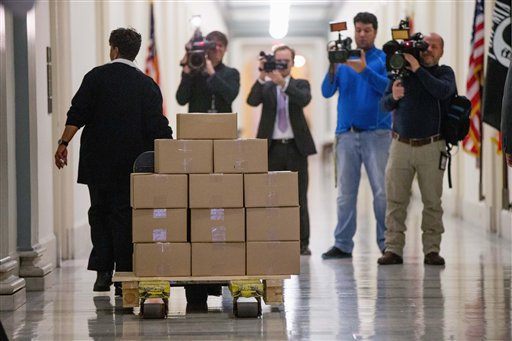President Barack Obama presented a budget to Congress on Tuesday that if enacted would add nearly $10 trillion to the national debt, according to the White House’s projections.
The president’s final budget, widely considered to be dead on arrival due to the Republican-controlled Congress, projects the nation would face a $27.4 trillion debt in 2026.
The budget set the actual total debt for 2015 at $18.1 trillion, projecting an increase of $9.3 trillion. When President Obama took office the debt stood at $10.6 trillion.
The White House budget for fiscal year 2017 includes old and new items of the president’s agenda, including the "Fair Share Tax" on the rich, known as the "Buffett Rule," and a new tax on oil that would increase taxes by $319 billion over 10 years.
The $4.1 trillion budget also includes raising the minimum wage, "free community college" for two years, and the hiring of 200 new Bureau of Alcohol, Tobacco, Firearms, and Explosives special agents to "reduce gun violence."
Obama again included his "preschool for all" initiative, which would cost $17.3 billion between 2017 and 2021, and total $66 billion over 10 years.
The budget claims it will "end family homelessness" at a cost of $1.2 billion by 2022.
A move to "standardize the definition for American Indians and Alaska Natives" used in Obamacare would cost $30 million in 2017.
Providing "full coverage of preventive health and tobacco cessation services" in Medicaid would cost $99 million in 2017 and $450 million by 2021.
Another budget item called "Enact RESPECT: Best Job in the World" would cost $50 million in 2017.
The budget also calls for a $12 billion increase in spending to have the government feed kids year-round.
"The Budget invests $12 billion over 10 years to create a permanent Summer Electronic Benefits Transfer for Children program that would provide all families with children eligible for free and reduced-price school meals access to supplemental food benefits during the summer months," the Office of Management and Budget said.
Obama’s proposal includes a heavy dose of funding related to climate change, including $1.3 billion to "advance the goals of the Global Climate Change Initiative (GCCI)."
"The challenge of climate change will define the contours of this century more dramatically than any other," Obama wrote in the introduction to his budget.
The funding includes $750 million for the "Green Climate Fund" to fight climate change in third-world countries. Taxpayer funding would also go towards implementing the president’s climate change plan for the United Nations summit in Paris last year.
The budget would also double spending on "clean energy research" from $6.4 billion in 2016 to $12.8 billion in 2021.
Funding for the Department of Transportation’s TIGER grants, many of which go to more bike paths, streetcar projects, and solar-paneled rest stops, would also nearly double.
The budget also increases taxes, with the creation of numerous new fees.
Aside from the "oil fee" of $10.25 per barrel, the budget would also impose a "financial fee" for large American firms.
"The Budget would also impose a new fee on large, highly-leveraged financial institutions," the administration said. "Specifically, the Budget would raise $111 billion over 10 years by imposing a seven basis point fee on the liabilities of large U.S. financial firms—the roughly 100 firms with assets over $50 billion."
Obama’s budget also introduces a Food Safety and Inspection Service fee; a biobased labeling fee; Grain Inspection, Packers, and Stockyards Administration fee ($30 million in 2017); an Animal Plant and Health Inspection Service fee ($20 million in 2017); and a Natural Resource and Conservation Service Conservation User fee.
Immigration inspection user fees would also be increased, as would custom user fees, which would raise $1.1 billion over 10 years.
The Environmental Protection Agency would begin collecting a "confidential business information management fee," and the Federal Communications Commission would impose a spectrum licenses user fee to raise $4.8 billion over 10 years.
Cuts are down in the president’s final budget, from $34.2 billion in 2016 to $28.8 billion.
The budget includes a $10 million cut to grants for the Department of Health and Human Services abstinence-only sex education programs and a $1 million reduction to the Department of Labor’s "Women in Apprenticeship and Nontraditional Occupations" program.
